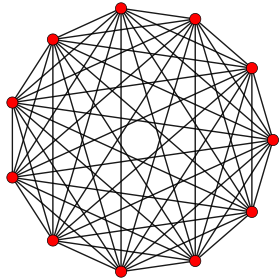| Regular hendecaxennon (10-simplex) | |
|---|---|
 Orthogonal projection inside Petrie polygon | |
| Type | Regular 10-polytope |
| Family | simplex |
| Schläfli symbol | {3,3,3,3,3,3,3,3,3} |
| Coxeter-Dynkin diagram | |
| 9-faces | 11 9-simplex |
| 8-faces | 55 8-simplex |
| 7-faces | 165 7-simplex |
| 6-faces | 330 6-simplex |
| 5-faces | 462 5-simplex |
| 4-faces | 462 5-cell |
| Cells | 330 tetrahedron |
| Faces | 165 triangle |
| Edges | 55 |
| Vertices | 11 |
| Vertex figure | 9-simplex |
| Petrie polygon | hendecagon |
| Coxeter group | A10 [3,3,3,3,3,3,3,3,3] |
| Dual | Self-dual |
| Properties | convex |
In geometry, a 10-simplex is a self-dual regular 10-polytope. It has 11 vertices, 55 edges, 165 triangle faces, 330 tetrahedral cells, 462 5-cell 4-faces, 462 5-simplex 5-faces, 330 6-simplex 6-faces, 165 7-simplex 7-faces, 55 8-simplex 8-faces, and 11 9-simplex 9-faces. Its dihedral angle is cos−1(1/10), or approximately 84.26°.
It can also be called a hendecaxennon, or hendeca-10-tope, as an 11-facetted polytope in 10-dimensions. The name hendecaxennon is derived from hendeca for 11 facets in Greek and -xenn (variation of ennea for nine), having 9-dimensional facets, and -on.
Coordinates
editThe Cartesian coordinates of the vertices of an origin-centered regular 10-simplex having edge length 2 are:
More simply, the vertices of the 10-simplex can be positioned in 11-space as permutations of (0,0,0,0,0,0,0,0,0,0,1). This construction is based on facets of the 11-orthoplex.
Images
edit| Ak Coxeter plane | A10 | A9 | A8 |
|---|---|---|---|
| Graph | |||
| Dihedral symmetry | [11] | [10] | [9] |
| Ak Coxeter plane | A7 | A6 | A5 |
| Graph | |||
| Dihedral symmetry | [8] | [7] | [6] |
| Ak Coxeter plane | A4 | A3 | A2 |
| Graph | |||
| Dihedral symmetry | [5] | [4] | [3] |
Related polytopes
editThe 2-skeleton of the 10-simplex is topologically related to the 11-cell abstract regular polychoron which has the same 11 vertices, 55 edges, but only 1/3 the faces (55).
References
edit- Coxeter, H.S.M.:
- — (1973). "Table I (iii): Regular Polytopes, three regular polytopes in n-dimensions (n≥5)". Regular Polytopes (3rd ed.). Dover. pp. 296. ISBN 0-486-61480-8.
- Sherk, F. Arthur; McMullen, Peter; Thompson, Anthony C.; Weiss, Asia Ivic, eds. (1995). Kaleidoscopes: Selected Writings of H.S.M. Coxeter. Wiley. ISBN 978-0-471-01003-6.
- (Paper 22) — (1940). "Regular and Semi Regular Polytopes I". Math. Zeit. 46: 380–407. doi:10.1007/BF01181449. ISBN 9780471010036. S2CID 186237114.
- (Paper 23) — (1985). "Regular and Semi-Regular Polytopes II". Math. Zeit. 188 (4): 559–591. doi:10.1007/BF01161657. S2CID 120429557.
- (Paper 24) — (1988). "Regular and Semi-Regular Polytopes III". Math. Zeit. 200: 3–45. doi:10.1007/BF01161745. S2CID 186237142.
- Conway, John H.; Burgiel, Heidi; Goodman-Strauss, Chaim (2008). "26. Hemicubes: 1n1". The Symmetries of Things. p. 409. ISBN 978-1-56881-220-5.
- Johnson, Norman (1991). Uniform Polytopes (Manuscript).
- Johnson, N.W. (1966). The Theory of Uniform Polytopes and Honeycombs (PhD). University of Toronto. OCLC 258527038.
- Klitzing, Richard. "10D uniform polytopes (polyxenna) x3o3o3o3o3o3o3o3o3o — ux".
External links
edit- Glossary for hyperspace, George Olshevsky.
- Polytopes of Various Dimensions
- Multi-dimensional Glossary